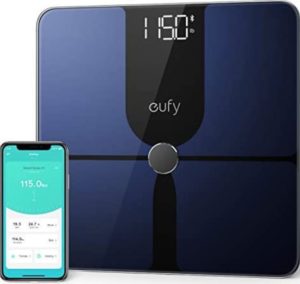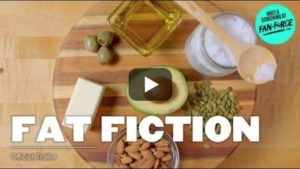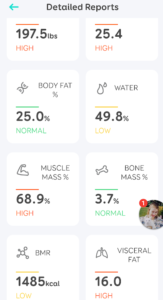My New Book! Don’t Diet: Research Nutrition
Okay, I don’t really have a new book. I’ve never tried a formal diet (mostly I research and speak on the economics of public policy debate topics). But like most people I have experience gaining and losing weight. In 2003 I lost about 30 pounds and thought turmoil at work was the reason. That weight returned gradually. In 2019 with a nifty new scale, I could measured not just weight but percentages of body fat, muscle, protein, bone, and water, plus visceral fat.
The Eufy scale claimed I was “obese” since BMI at 30 and body fat percentage at 31. And the Eufy showed 230 pounds, up from a usual 220.
My father suffered from Type 2 diabetes for some fifteen years and had long been overweight. Looking in the mirror, I looked okay…until turning sideways.
So, I read reality from the scale each morning and began watching online presentations from Low Carb Down Under on YouTube, plus a 2019 Cato talk by Nina Teicholz (author of The Big Fat Surprise), and the 2015 John Mackey/Nina Teicholz debate at the NYC Junto.
Checking weight and body fat each morning and researching nutrition science and policy each day, by mid-May I’d lost 13 pounds without really trying. Many of the doctors and nutrition researchers were emphatic about the damage and dangers of sugar, refined carbs, vegetable (or seed) oils, and even whole grains. Suddenly I didn’t want Hershey’s too-sweet chocolates, ice cream bars, or packaged cookies. Lots in the house and I often looked at them, puzzled why they no longer called for me. (Likely because the gut microbiome that used to do the calling and long fed on sugar and carbs had been starved and flushed away. But that’s a separate story told in Ed Yong’s 2018 book, I Contain Multitudes: The Microbes Within Us and a Grander View of Life .)
My taste buds had been reset so less sugar tasted sweeter and even unsweetened cocoa and coconut oil in coffee tasted good (though sometimes not the first sip).
My first post on this nutrition adventure reported:
Today, May 16, my BMI and body fat percentages are still high: 27.6% and 28.4%, (under 25% is recommended). Two weeks ago, on May 3, both measures were higher: BMI was 29.3% and body fat was 30.3%. I weighed 228.3 on May 3 and this morning, two weeks later, weigh 215.3. Maybe I could write my own book with a title like “Don’t Diet: Just Watch Low Carb Down Under Videos.” The Distant Metabolic Gift vs. Low-Fat Federal Dietary Guidelines (EconomicThinking.org)
As I was learning more about nutrition science and policy, the coronavirus pandemic and lockdowns knocked the world sideways, throwing millions out of work and filling already crowded hospitals.
Astonishing were claims of the coronavirus epidemic as a chapter in the expanding epidemic of cardiovascular disease, cancer, obesity, and diabetes. Or at least that was the case made by the MDs and nutrition researchers in the videos I was watching and podcasts I listened to each day. (With divergent claims: vegan/vegetarian plant-based diet researchers on one side, opposing claims from low-carb, high fat, carnivore, paleo, and keto researchers on the other side.)
Let’s Debate Nutrition and Public Health Policy
Nutrition/Public Health policy isn’t a formal national debate topic but is an informal one: each day’s news and social media feeds are full of public health claims, fears, policies, and predictions. High school and homeschool debaters can expect pandemic and lockdown topics and motions at tournaments through the school year.
Plus the E.U. and U.S. economic downturn and fiscal crunch, caused by the pandemic and lockdowns, will impact every debate case.
While media spotlight shines on the coronavirus and Covid-19, the bigger reality is poor health across the U.S., E.U., and developing world. An ongoing and expanding epidemic of chronic lifestyle diseases is swamping all health care systems, with worse to come. But good luck finding even a definition of metabolic syndrome, much less agreement on its causes. CDC articles, to me, seem obscure and research papers convoluted.
What nutritional advice should we listen to and follow? Low fat or low carb? Whole grains or no grains? Eat often and snack, or less often with time constraints or intermittent fasting? Podcast and social media battles are ongoing. Lots to discuss and debate. My suggestion is not to “follow” any nutritional advice, but instead do your own research. Just learning about the metabolic damage caused by poor nutrition is enough to guide better eating habits (at least it was for me). I’m still learning from books, videos, articles, and podcasts.

Nutrition and public health should be a formal debate topic. Critics across the nutritional spectrum blame the Center for Disease Control itself, along with NIH, USDA, FDA, for being too much influenced by the pharmaceutical and food industries. The “food as medicine” tradition has been lost. Anyone advertising “An Apple a Day Keeps the Doctor Away” would be violating FDA guidelines.
Federal nutritional policies, critics say, have contributed to poor health through misguided food pyramid/plate guidelines. Millions of public school students, prisoners, and elderly in hospitals and nursing homes have their health undermined by misguided federal nutritional guidelines. These problems and claims are discussed in previous nutrition posts, on the Nutrition Coalition website, and the recent documentary Fat Fiction.
(Many mainstream MDs and nutrition researchers disagree with the insulin resistance view of metabolic syndrome. More on this debate in podcasts and website links at end of post. Or check NutritionFacts.org now.)
To Live and Die in America
Each day some 3,400 Americans die of heart disease and cancer, three times current (July 23) Covid-19 deaths. Daily average U.S. mortality was 7,708 in 2017, six or seven times daily Covid-19 mortality. How many of these “average” daily deaths were caused or contributed to by lifestyle-caused metabolic syndrome?
Concluding, here is update on my nutrition adventure. I’ve been influenced by MDs and nutrition researchers who recommend eating less often, even fasting. Now I don’t get hungry as much. I’ve been reading and influenced by Jay Richard’s book Eat, Fast, Feast (discussed on earlier post).
Yesterday, finally, my Eufy scale revealed my body fat percentage hit “normal.” So that is progress. I’m exercising more, feel better, and as important, learning more about nutrition science. I’m not following anyone and instead just researching nutrition science as I would a debate topic. Knowing more is guiding what I eat.
The Covid-19 pandemic fading (though cases are growing as testing reveals how widespread the coronavirus is and has been). But death rates are much less than they were in April. Again though, it seems like we have to wait two weeks to know if new cases and hospitalizations will boost fatalities.
Recent antibody tests reveal fatality rates are much less than earlier thought and we learn more each day of the human bodies amazing immune system.
I recommend this interview: We may already have herd immunity – an interview with Professor Sunetra Gupta (Reaction, July 21, 2020) to learn more:
It’s one thing to get infected and not ill, but what the new studies are showing is that people are actually fighting off infection. So at an even more basic level, the pre-existing antibodies or T-cell responses against coronaviruses seem to protect against infection, not just the outcome of infection.””It’s one thing to get infected and not ill, but what the new studies are showing is that people are actually fighting off infection. So at an even more basic level, the pre-existing antibodies or T-cell responses against coronaviruses seem to protect against infection, not just the outcome of infection.
Nutrition articles, podcasts, and debates
• Nutrition Coalition For Dietary Policy Based on Rigorous Science
• CrossFit is amassing an army of doctors trying to disrupt health care (Vox, December 13, 2018) Story of launching CrossFit Health.
For Low-carb and keto diets. Interviews with MDs and researchers
• Diet Doctor Podcast
• Low Carb Down Under Podcasts
• The Fat Emperor Podcast
• Pursuing Health Podcast (Drs. Dani Urcuyo & Julie Foucher-Urcuyo)
Against or mostly against low-carb and keto diets
• NutritionFacts.org against Keto diets pro “whole plant diet”
• NutritionFacts.org: Keto Diet Theory Put to the Test
• NutritionFacts.org: Modifiable Risk Factors and Comorbidities for Severe COVID-19 Infection Air pollution!
• Diet Wars Podcast
• Diet Wars EP1) Discussing Insulin Resistance and Keto for Type 2 Diabetes (against low-carb, but both sides represented, I think)
(Incomplete list. Hope to add more soon. Also see the all Economic Thinking nutrition posts.)
